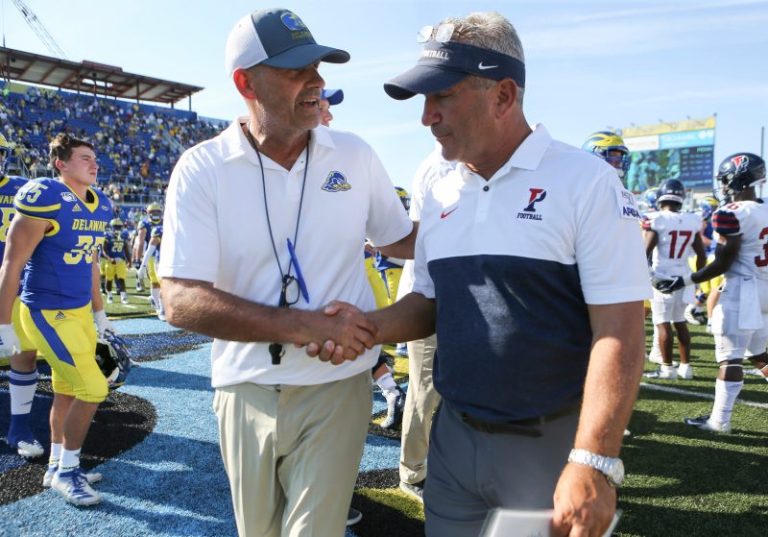Getting recruited: This is Part 1 of a series that looks behind the curtain of college recruiting. USA TODAY Sports was granted behind-the-scenes access by the football staff at the University of Pennsylvania, a Division I program that offers a high academic profile but no Name, Image and Likeness (NIL) money or scholarships. This week: How does a kid get started?
PHILADELPHIA – As you walk onto the turf of old Franklin Field, down through its state-of-the-art weight room, and up into its older crevices where the University of Pennsylvania’s football offices reside, there is uncertainty.
There is lots of pep, of course, too, that flows through the coaches as they shout instructions to players, who hoot and holler as plays are executed, or stopped.
But there is, amid all the athletic history and competitive spirit around here, a sense of unpredictability that blankets everything like the cold, misty rain at practice earlier this week.
Head coach Ray Priore has walked this field for 38 years as a coach, out of an era where he lugged two duffel bags full of VHS tapes home from recruiting trips into one where he can click on player videos in an instant. Today, he and his staff serve as daily sport and life teachers, background checkers and relationship builders. They say recruiting is an everyday thing.
They sell the coveted academic opportunities outside of sports of an Ivy League school. Yet they aren’t completely sure what their team will look like each year in this era of the transfer portal and opportunities to make hundreds of thousands of dollars at another university in NIL money,
All of that selling – Priore says facetiously he feels like a car salesman – could easily be for naught. The coaches say they can’t afford to waste time. Sometimes, they say they can’t afford to say no to anyone, at least at first, in a recruiting world that seems to have sped up overnight.
“Our quick process has to be, ‘Is he a A-level player?’ ” Priore tells USA TODAY Sports. “D, don’t recruit. C, bring him to camp. A and B, they’re in the mix. And then quickly get their transcript, get their address, type into Zillow, ‘What’s that house worth? What does mom and dad do for work?’ You’re trying to pull it all together in a really short period of time.”
They try to sell A-level players on their bustling urban-yet-walkable campus. They work with confidence in what they do but with the uncertainty of someone in the early stages of a romantic relationship.
“Are you asking somebody out? Are you going steady? Are you getting engaged? Or are we getting the ring or walking down the aisle?” says Priore, who has been Penn’s head football coach since 2015. “There are all these different stages, as I look at it (as) sort of recruiting of a relationship. It’s all relationship building and as relationships happen, you go from one step to the next step: ‘We’re not getting married. I just met you. We need to get to know each other a little better.’ ‘
Do you sometimes feel overwhelmed as a kid athlete and parent seeking to play at the next level? So do these coaches. They sift through thousands of names, not knowing if they can get you, but looking for something that makes you stand out.
Here is advice from Priore and his staff:
‘Ripped our hearts out’: Coaches want to know what’s inside of you
Penn (5-4, 3-3 Ivy League) plays its final game of the season, against Princeton, on Saturday, Nov. 22. The Quakers led Harvard, ranked No. 10 in the Football Championship Series (FCS), by a point last weekend following a 30-yard field goal from Mason Walters with 22 seconds remaining in the game. But Crimson quarterback Jaden Craig completed three passes to set up sophomore Kieran Corr’s 53-yard game-winning field goal.
‘Ripped our hearts out,’ Priore says, ‘but as I tell our kids, there’s going to be another day.’
Still, coaches at this level are judged by whether or not they win, not only by school administration but potential recruits and their parents. I asked Bob Benson, the team’s defensive coordinator and associate head coach, if it was possible to look at his job strictly this way.
“Mission first, people always,” he said, citing a longtime military principle.
He thought about the question some more as we wound our way on a tour of the team’s revamped football locker room at Franklin Field that rivaled the regality of most Major League Baseball clubhouses I’ve seen.
“It all sounds good, right?” he says. “But when you put ($27 million) into this and it’s all football money, they want to win. Now, we screwed up two weeks ago. We got beat by Cornell at home. At homecoming.
“I know we screwed up the Harvard game. … I don’t want to say you have to win, but you do. But you’re still coaching 17- and 18-year-olds. You know? And that’s the education business, but mistakes occur all the time. I mean, you just saw that practice.”
The team has 10 full-time coaches, who divvy up their on-field duties with coordinating a national search for players. Benson was head football coach at Georgetown for 13 years and has been a coach on the staff at Towson, Johns Hopkins and the Colorado School of Mines. His recruiting coverage area for Penn includes New Jersey, Virginia and Colorado as well as Philadelphia and Washington, D.C. He’s also in charge of all defensive backs.
He took me to the team’s conference room and called up the recruiting database. He searched for safeties from the high school class of 2027 with better than a 3.0 grade point average and an athletic rating (from the scouting service XOS) of between 2.5 and 4.5, with 4.0 in XOS being a typical Ivy League player.
A list of 580 safeties appeared before him.
“My job is to watch them,” Benson said. “All of them. Overwhelming.”
He and his colleagues can’t possibly know everything about all of them, which is where you the player, or the high school coach, and your personal touches come in.
“We’d all love a five-star if you could check out that he’s a hard worker, that he has good character, all of those other intangible qualities kind of match up,” says Jon Dupont, Penn’s linebackers coach and recruiting coordinator. “And we’ve had guys transfer from FBS programs or we’ve had highly touted recruits in the program, but the really important information is the character.
“And that’s where I think we as coaches sometimes lean too much on just film and outside evaluation. You really have to develop a relationship with a recruit and the high school coach, who will be honest with you because he’s not getting paid to promote his players. His reputation depends on his recommendation.”
When they’re out recruiting, Dupont and Priore, the head coach, like to talk to people at schools who not associated with the football coach.
“We’ll go into a school and I’m going to talk to that security guard at the front door,” Priore says. “Do you know Tommy? ‘Tommy who?’ That’s a good answer. That means the kid’s never in trouble.”
Less often, someone in the front office might offer a tidbit about a player’s nature.
“You’re here to see him?” he might hear. “Johnny’s a great kid.”
Like Dupont tells his own son, 15, and daughter, 12: Don’t skip class, don’t skip school, be polite to people. You never know who is observing you.
YOUTH SPORTS SURVIVAL GUIDE: Pre-order Coach Steve’s upcoming book for young athletes and their parents
Look for physical ways you can stand out, and widely share them
College coaches, at every level, see droves of impressive numbers such as a 4.6 in the 40-yard dash, maximum reps at 225 in bench press and robust heights and weights. Priore tries to look beyond them.
“He may not be showing on the field but what’s his wingspan?” Priore says. “You may not be tall, may not be playing well, (but) kid jumps a 36-inch vertical jump, wide receiver, you’re like, ‘Whoa! This kid’s got something.’ And you really see it in the explosive things. Vertical jump, broad jump. … Put your toes on the line and jump out.
“Being strong doesn’t mean you’ll be a good football player. But explosive powers are really things that you look at.”
He likes videos of kids dunking a basketball or slapping a backboard. Find a unique, explosive skill you have and share it.
“I’m mindful that we need to create a social media account for my kids where there can be a communication from coaches (so) coaches can find them and look them up and get their information easily from them,” says Dupont, the recruiting coordinator. “You have to be proactive in the recruiting process as well. If you’re a dude, they’re going to come to you. But if you’re Johnny and you’re a good football player and you’re all conference, you need to put that out there. And if you don’t do that, it’s going to be hard.”
Be patient and realistic: You might not really be getting recruited
When you get a follow back on social media from a coach, it doesn’t necessarily mean they are interested in you. The same goes for mass mailings you might receive from schools looking for prospects, but also looking to make money for their programs at camps they host.
“I think some parents look at that as a bad thing,” Dupont says. “It’s like, ‘Oh, well, this is just general communication.’ Well, yeah, it is but recruiting’s a two-way street. And if you have an interest in us and we send you a message and you reply, there’s an interest on your end. We can start developing the relationship there. But there are some parents that just bulldoze through the process. That will push people away more than anything.”
A good rule of thumb for any sport to distinguish whether or not a program is interested in you is whether or not you get a personal text message or phone call from a coach during the appropriate communication windows.
Remember the dating game. Would you fly from Texas to Chicago to see someone with whom you haven’t really communicated? If you are interested in playing for a school, attend their camp, but don’t assume the school is interested in you just because you received a letter or email from it.
When Priore was growing up, he got a letter from Joe Paterno.
“I could not play at Penn State,” he says, laughing. “All these services now can personalize everything but people don’t realize it. So what they’re getting is a pretty nice graphic. Even on a text. I mean, pretty nice things that seem very fancy. And it’s real, so don’t get me wrong, but are they really talking to you? Are they really recruiting you? I’m the head coach. I just spoke to you. Have you spoken to any other coach on the phone? ‘No coach.’ ”
According to Dupont, every high school football team in America uses Hudl software, which you can use to create highlights and a PDF with contact information and send it all out to schools. Present your film and academic information to first give them a chance to see if you are a fit. Then try following up.
You can’t get an offer unless you get into the school
When he electronically searches for players, Dupont filters out grade point average before he looks at player ability. “That’s the most important part,” he says.
In the state of Ohio, for example, one of his areas of responsibility, he watches prospects with a GPA of 3.5 or better. Ivy League schools also scrutinize what is known as your academic rigor, which means they like students who take a heavy load of college preparatory and Advanced Placement (AP) courses.
Financial aid in the Ivy League is based on need, not academics or athletics. Some of Penn’s players receive full need, the equivalent of a full scholarship, but they have to get in first.
“You have to get approved by the dean,” Benson says. “And if they don’t like your rigor, they’re gonna say (no). Because things have accelerated so much, we’ve gotten the opportunity to have them change their transcripts in the summer. So they can add three APs (to their high school senior course load). So that’s what we do a lot of now.”
Back in the conference room, Benson found a player among the 580 safeties in the Class of 2027 database who had a 2.5 XOS ranking, meaning, Benson says, he’s probably a big-time player. His GPA was 3.0
Strong standardized test scores, say a 1350 SAT or above, might help him get in, but most likely not.
“You could be the best athlete in the world,” Priore, the head coach, says, ‘but we can’t get you in, it doesn’t matter.”
Part II coming next weekend:Steps a recruit can take once you cast your net
This post appeared first on USA TODAY










